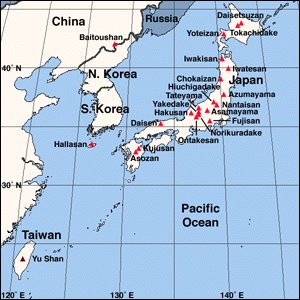Rise, Japan(image via youtube)
The Corsair has been an admirer of Japanese civilization. Not the submissive fetishization of Japanese women so popular in Suburbia and Wall Street; by Japanese civilization, we mean: Shinto architecture, elegant samurai culture, and, especially, Noh theater, with its sculptural movements and rich flavor of remote antiquity.
Unfortunately, that noble civilization has had to put up with a present pudding-like soft-power situation in which their Prime Minister alternately dances with Richard Gere (Gere took the lead), and portraying himself as an admirer of Elvis Presley. Proud samaurai are turning in their graves at this afront to .. "face". (Exaggerated cough suggesting feigned detachment)

(image via skimountaineer)
This is because, of course, Japan is prohibited from having a military to defend itself. Never mind that Pearl Harbor was a lifetime -- 61 years -- ago. Defenseless among Predators, it is easy to forgive Koizumi's buffoonishness, however un-Japanese the behavior. The Prime Minister's love for hip-swiveling rock and roll is based on the Mutual Security Treaty of 1951.
We wrote in April:
"As the destinies of the Taiwan and the Koreas (as well as, increasingly, and disturbingly, Russia's) become more economically intertwined with China, conservative Japan must be feeling rather claustophobic. The Corsair has always been of the opinion that the remilitarization of Japan ought to be a vital goal of American foreign policy. The Sino-American alliance is the linchpin of our Pacific policy. (The Corsair sips a glass of dry Sake)And China's economic aid package today to their Pacific allies should be a wake-up call to the masters of American-Pacific policy.
The cautious handlers of Beijing make few foreign policy errors. One such error, though, may be their over-agressive mock charges at an increasingly nationalistic Japan (for further reference see Chinese aggression in the Cunxao gas fields). As we get older we have resigned ourself to the belief -- like Hobbes and Machiavelli pronounced -- that the primary motivating force that activates the Will of nation-states is fear. Enter, Stage Right: a claustrophbic Japan.
"Article 9 of the Japanese Constitution is thorougly obsolete. The nationalists control the Japanese Diet and public opinion is growing increasingly anti-Chinese. The most recent incarnation of Chinese aggression emanates from the fact that Prime Minister Koizumi's conservative government has ties to the political leadership in the 30s and 40s, which was part of what the mandarins in Beijing refer to as 'The War Against Japanese Agression.' In addition, there's the thorny matter of Koizumi's provocative fourth visit to Yasukuni (which, we cannot fail to note, was opposed by 5 of the 6 major Japanese papers and 6 former Prime Ministers).
"If the United States were to signal that the Japanese Diet's abolition of Article 9 would be amenable, of course, China would act aggressively. That is, unless the United States strongly opposed it."
Tha is why we are baffled -- baffled! -- by zbigniew brzezinski on Wolf Blitzer's softball talking head show Late Edition on Sunday warning about the possible nuclearization on Japan> The Corsair asks, once more, What is wrong with a nuclearized Japan?
Japan is an ally with a stable, mature government. Japan is a Junior partner in the War on Terror and our most important ally in Asia. Further, we cannot fail to note that it is the only nation that has had an atomic bomb used against it. A nuclearized Japan would curtail Chinese ambitions (Taiwan, for instance), give Kim Jong-Il pause, and some needed discipline and relax America's burden of regional defense (i.e. bases, missile defense).
Time Magazine informs us in this week's cover story that the president now eschews Bubbaspeak and embraces the complicated Art of Diplomacy. Offstage, however, China has had a massive diplomatic headstart, maneuvering The Russian Bear and the G-77 under it's moist Dragon wings. Enter: Japan.
Granted, Hiroshima was a great national trauma. But it is a Dangerous world. The growing Japanese Nationalism against the growing threat of Chinese aggression and North korean irrationalism all lead to an eventual Japanese nuclearization, unless we contiune to oppose it. But why do that?
Pearl Harbor was 65 years ago. Must we wait until the entire generation that experienced the horror of that day passes before we get a wise and objective reconsidering of Sino-US relations vis-a-vis nuclear weopons in Today's gladitorial fundament of Nations?
3 comments:
Let's set aside that failing to oppose the nuclearization of Japan would remove whatever shreds of credibility we have left when dealing with the DPRK and Iran. How does a nuclear arms race in the Pacific turn out any better than the one we just got finished with?
What credibility do we have with either the DPRK or Iran? And, in case you hadn't noticed there already is a nuclear arms race in the Pacific. Leaving Japan out of it increases their existential anxieties and forces us to shoulder the economic burdens (and sociopolitical, considering Japenese opposition and cultureclashes around bases) of missile defense systems when we ought not to (Japanese interest rates have risen from zero percent, signalling -- finally -- that they are out of their economic slump) Containment --to a degree -- is necessary; but let's be realistic. It is absurd to expect Japan to cling to America's hem when Kim Jong-il inches closer to a nuclear weopon within strike range (and China and Russia, historical enemies of Japan, continue military testing off the Japanese coast) --A nuclear Japan curtails Kim jong-il better than any diplomatic 6-party talks (which, BTW, have been as fraught with surrealism and showmanship as the EU-Iran talks, and just about as fruitful).
thanks for the intelligent, thought-provoking comment, analogcabin,
R
Post a Comment